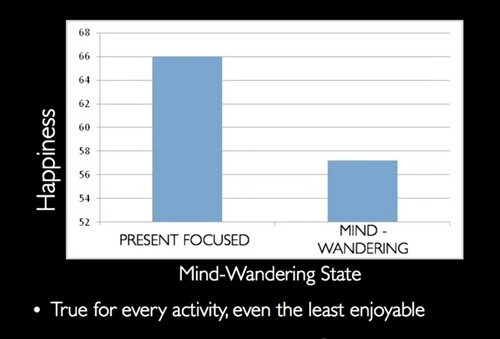#1 Way to be Happy, says Science
Happiness has been heavily researched in psychology. We know from both our everyday experience and the psychological literature that external things are frequently hypothesized as the reason for one's happiness. For example, it's long been stated that higher income is associated with more happiness than those in poverty- and that married people are statistically happier than non-married people. However, the truth is that the differences are slight. More recent psychological research (now that we are asking the right questions) is showing that these and other external circumstances do not generally have a large influence on moment to moment happiness- but something else does!
It turns out that the largest single predictor of happiness is not something outside of us at all. It is not circumstantial. It is not something we can "get" or "get to". It is not in the new car, it's not in Hawaii, the latest iPhone, your partner or a lavish vacation (ever had a bad vacation).
Happiness comes from the Inside-out. The largest statistically significant predictor of happiness is the internal state of presence. Being fully engaged in what is happening now, where you are, who you are with or what you are doing NOW, no matter what that is, is the strongest predictor of "happiness".
"Our journey is about being more deeply involved in life and yet, less attached to it" "Be Here Now"
~ Ram Dass
Harvard trained psychological researcher Dr. Matt Killingsworth researched over 15,000 people ranging in education, occupation and age across 80 different countries via an iPhone app. Users received random pings throughout their day asking them to share their current mood and their current activity. What Killingsworth discovered, was that mind wandering was greatly predictive of unhappiness, regardless of activity. Full engagement with the present moment, even during seemingly unpleasant circumstances like waiting in line, was associated with positive mood. See his graph below:

Why? When our minds are wandering away from what we are doing, we disconnect, not just from others but from the vital experience of being alive. We lock ourselves in our heads, worry over something in the future, ruminate on the past or attempt to solve the unsolvable. Killingsworth also noted a strong relationship between mind wandering now and unhappiness later. However, there he found no relationship with engagement in the now (doing what you are actually doing) and unhappiness later.
In this age of distraction, we have learned how to be anywhere but here. Many of us have set up our whole way of being based on escapism and distraction tactics. We are largely afraid to just be present, we don't know how. This is because we've been trained to believe that happiness lies outside of us. Does this sound familiar? Fill in the blanks below with your favorites:
I will be happy when _____________ happens. I will be happy after I get________________________. I will only be happy if he______________________. I will feel better when I drink this______. I can relax when I make__________.
These "if __then" scenarios are lies. They are part of what inspirational Coach and Clarity author Jamie Smart calls the "Outside-In Misunderstanding". We've been indoctrinated to believe that happiness exists somewhere else, outside of us, and we can only "get it" if we get__________________. We are forever trying to get somewhere else, be someone else or do something else. This misunderstanding of how life works sets us up to constantly seek something else.
This Outside-In Misunderstanding is just this, a misunderstanding of how we work; Our base programming is bunk. Living our lives on the platform of the Outside-in Misunderstanding is like being plugged into TheMatrix. Like Neo, we cannot unplug from this misunderstanding- until we can see that we are plugged in.
Ready to Unplug?
We cannot de-program ourselves without learning how our minds operate. This is where mindfulness comes in! As a mindfulness based clinical psychologist, I help people become present. In mindfulness based psychotherapy there are no ordinary moments, whatever we are facing in our lives is the opportunity. We tune in to this moment. We practice presence.
The first step is to clearly experience and notice that nature of your mind. We foster this experience by learning mindfulness skills such as Wise Mind, Observe, Describe, Participate, somatic mindfulness, urge surfing, notice and breathe, formal mindfulness meditation and lots and lots of practice.
There is no where to go, nothing to do, nothing to get.
Happiness is not outside of you. It is always and only within you.
May you be fully present in this moment.
Love & Light,
Dr. Regina

